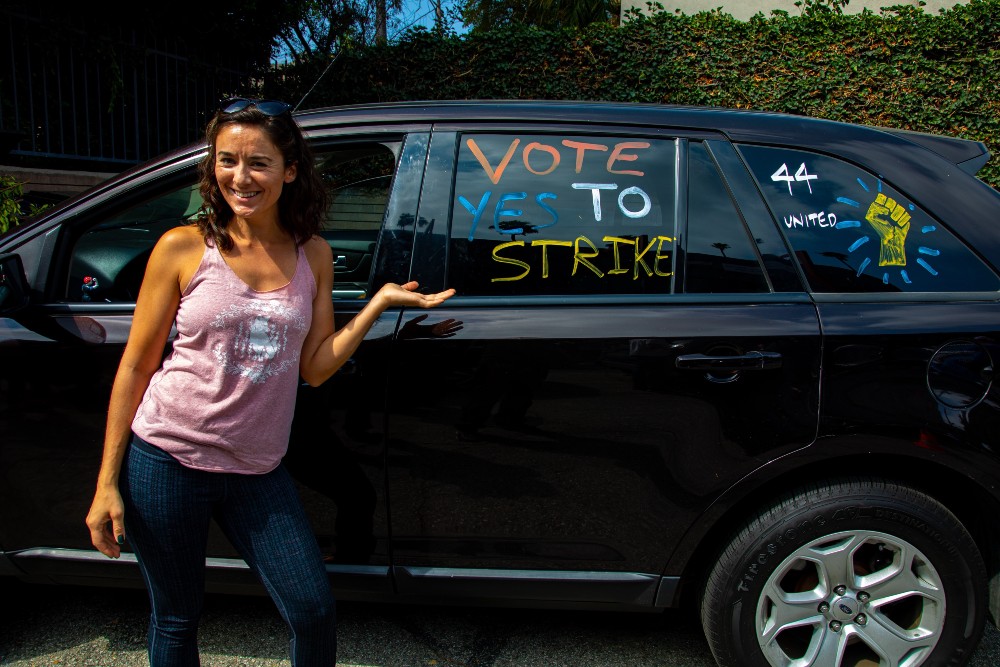 The results are in, and well, it seems the people have spoken — those people making up the rank and file of IATSE — and evidently, their wishes were ignored by the electoral-college style voting system the union has instituted for contract ratification.
The results are in, and well, it seems the people have spoken — those people making up the rank and file of IATSE — and evidently, their wishes were ignored by the electoral-college style voting system the union has instituted for contract ratification.
The approval announcement was made on Monday, after a weekend of electronic voting by IA members, which saw only a 72% participation. That number may be high by historical ratification standards, but the “only” comes into play when contrasted with the 90% that voted to authorize a strike, leaving one to wonder about the factors that deflated engagement nearly 20%, in just a few short weeks.
Interestingly, in announcing the results, which came in about midday on the West Coast, the IATSE release said that “a combined 50.3% voted yes and 49.7% voted no for both contracts,” which is a bit like aggregating votes on ballot propositions covering similar ground, and saying “look, majority support!”
What happened though is that while the Area Standards agreement passed 52% to 48%, the Basic Agreement, affecting Hollywood’s unions, actually lost, as “the popular vote came in at 49.6% yes to 50.4% no.”
The agreement only passed, then, because of the delegate votes apportioned to each local — analogous to an electoral college style system — bringing the total for the Basic Agreement to 256 yes and 188 no. Interestingly, on this level, the Area Standards Agreement was closer, at 103 yes votes to 94 no.
In a further breakdown, IATSE’s release noted that “for the Basic Agreement eight locals voted yes, and five locals voted no. Among the Area Standards local unions, 14 locals voted yes and nine voted no.”

Their release didn’t specify which locals were which, but later reports surfaced, on Twitter, a Hollywood Reporter article, and elsewhere, that the two largest locals affected by the Basic Agreement split: “Rejected by Local 600 (International Cinematographers Guild) with a 52 percent ‘no’ vote and just passed in Local 700 (Motion Picture Editors Guild) with a 51.9 percent ‘yes’ vote,” meaning the two locals who dwell across the street from each other, and shared parking lots for an automotive “paint-in” to encourage a strike vote, actually split on the outcome.
It’s entirely probable that the Cinematographers, shocked by the Halyna Hutchins’ shooting, didn’t see the agreement with its 10-hour turnarounds, as doing enough to underscore safety, from a non-sleep-deprived standpoint.
Remember that additional specific safety concerns couldn’t be addressed in this contract, since only what had been negotiated between IATSE and the AMPTP at the time, could be ratified. Or not. Indeed, a calculated “not” vote could be seen as calling for going back to the bargaining table (as opposed to supporting an immediate shutdown), precisely to add more safety specifics that now will have to wait three years, for the next contract.
Looking further into which locals supported the settlement, and which didn’t, it appears that Costume Designers, Medics, and Stage Lighting joined Cinematographers in rejecting the contract, while Art Directors, Craftspeople, Makeup, and Script Supervisors joined Editors, in accentuating the positive. For Script Supervisors, getting a substantial raise, the vote makes sense. And perhaps, too, for Editors, and sometimes Art Directors, who don’t always have to be on set — to the degree costumers do. But Makeup and Craftspeople clearly want to get back to their trailers and stages. Will this all be water under the bridge, between coworkers, or will tensions between locals, with agendas now seeming a tad less unified than they did just a few days ago, begin to emerge? Especially since, by any definition of “election,” the side, proposition, or person getting the most votes, wins.
But when electors of various stripes overrule those votes, chaos generally tends to ensue. Or at a minimum, a certain loss of credibility. With a labor movement increasingly flexing its muscle on the American landscape, what will the perception be, for those either contemplating unionizing in the first place, or gearing up for a strike if they’re already in one, if one of the most publicly visible unions in the country has been seen as — for all intents and purposes — overruling the will of its membership?
https://twitter.com/notsayingsoryu/status/1460347802077130757
IA President Matthew Loeb said, in the aftermath of the announcement, the ratification represents “an unprecedented opportunity to drive more participation in our union.” On the other hand, rank-and-filers on Twitter are saying things like, “IATSE supports me in my decision to leave the film industry and work in a field where pay and hours actually match,” while another account, a NY-based IA worker and self-identified “union thug,” said, “This was really our only chance as @IATSE members to put an end to the abusive industry-standard conditions we are forced to deal with. To say I’m disappointed would be the understatement of my life.”
https://twitter.com/t_NYC/status/1460320472403525639
So while there won’t be any official strikes, whether the majority of members who voted against the Basic Agreement stays energized — and how that energy will manifest — remains to be seen. Will there be larger cultural shifts on-set, making working conditions better, outside of the contract’s specific letter of the law? Or will a return to conditions perceived as “barely changed” from the pre-strike agreement era spark leadership struggles within the IA itself?
And what of the larger labor landscape, where, to take but two examples, striking Kellogg’s workers in Omaha are now being sued by the company for allegedly blocking entrances to the plant, and John Deere workers in the UAW are about to vote on their third tentative offer — after rejecting the previous two?
Kellogg’s workers, it should be noted, also rejected previous offers, and it remains to be seen in this context whether the IA will be seen as savvier negotiators, who were able to win a good deal ahead of other industries, or whether they ultimately folded too easily, and too soon.
The fact that membership, on the whole, actually rejected the current Basic Agreement makes the former narrative a bit of a harder sell than the latter one. The real story of this settlement’s legacy will continue to unfold, however, on locations and sets over the next 36 months.
 Mark London Williams is a BTL alum who currently covers Hollywood, its contents and discontents, in his recurring “Across the Pond” dispatch for British Cinematographer magazine, contributes to other showbiz and production-minded sites, and musters out the occasional zombie, pandemic-themed, or demon-tinged book and script, causing an increased blurring in terms of what still feels like “fiction.”
Mark London Williams is a BTL alum who currently covers Hollywood, its contents and discontents, in his recurring “Across the Pond” dispatch for British Cinematographer magazine, contributes to other showbiz and production-minded sites, and musters out the occasional zombie, pandemic-themed, or demon-tinged book and script, causing an increased blurring in terms of what still feels like “fiction.”
Mark London Williams’ Strike Alert column will appear every Tuesday. You can reach him to give him tips and feedback at [email protected]. He can also be found on Twitter @TricksterInk.
Photos courtesy of the respective copyright holders.





